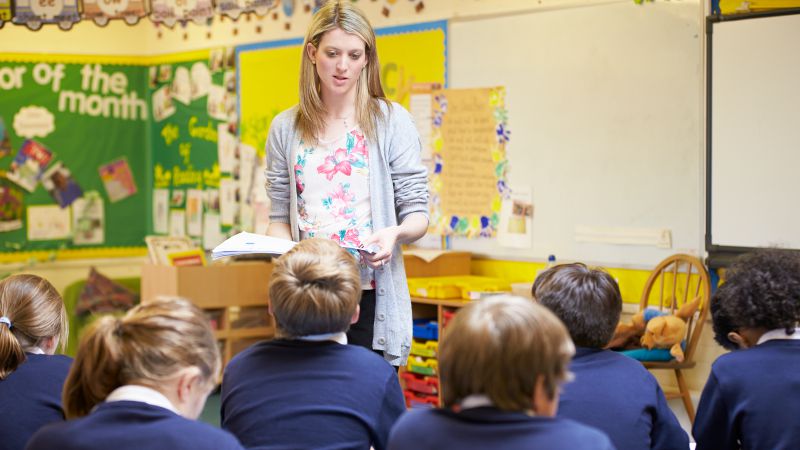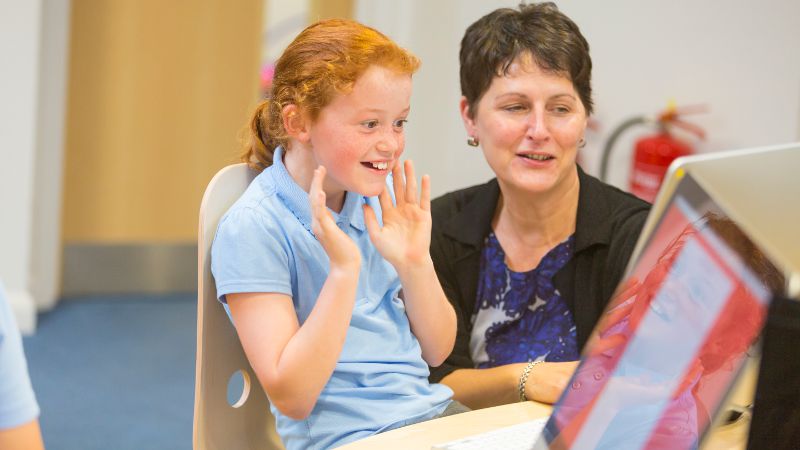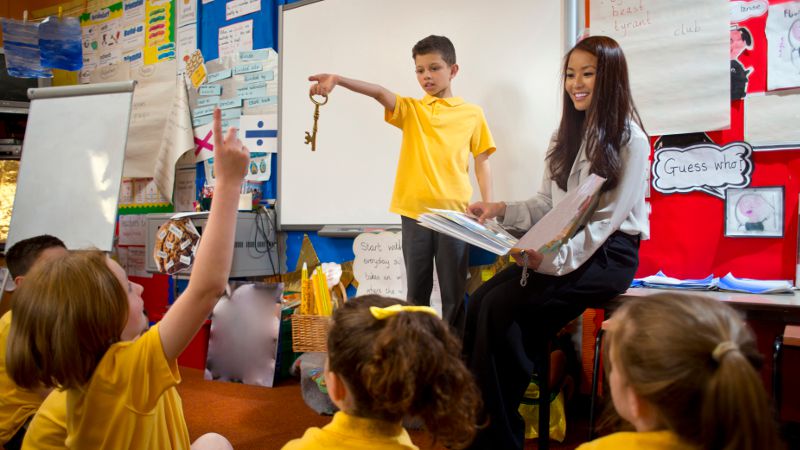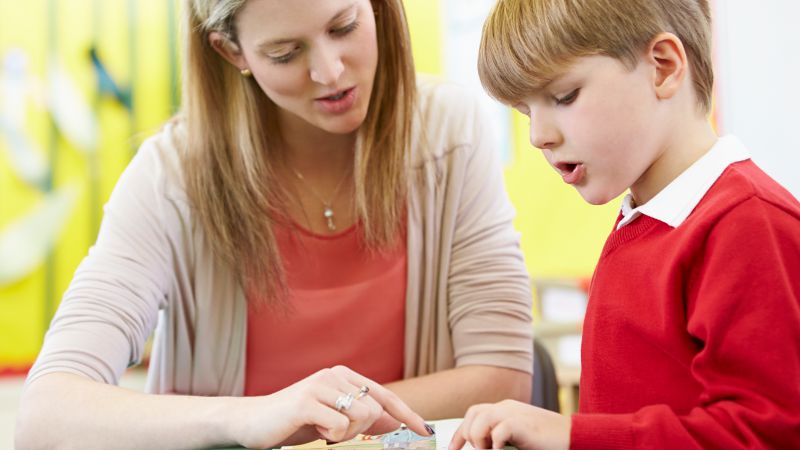
Building Rapport in the Classroom
A Guide for Teachers and Teacher Aides
Building rapport – developing positive relationships within the bounds of professional standards.

Building rapport is not a teaching and learning strategy in the technical sense. Teachers don’t specifically plan for building rapport and no significant part of any lesson is devoted to it. It is however one of the most effective strategies for motivating students.i Rapport can be thought of as a harmonious relationship that enables effective communication, improved work outcomes and the quick resolution of issues. Rapport is based on trust and respect. It involves learning about another person – their interests, likes, dislikes, personality, moods, views, opinions, values, goals, history, and so forth. It is a professional relationship that allows problems and issues to be easily resolved or avoided altogether.
If people have rapport, it means that they work well together, they enjoy each other’s company and they coordinate their efforts to achieve shared goals. It is the basis of a positive work environment and high job satisfaction. The level of rapport between a teacher and their students is a key indicator of a teacher’s success in developing a positive classroom dynamic. The importance of developing rapport applies to all students irrespective of age, subject, background, disability, intellect or abilities.
Rapport can be thought of as a harmonious relationship that enables effective communication, improved work outcomes and the quick resolution of issues. Rapport is based on trust and respect.
Humans are social creatures; what others think about us and how they treat us matters. We gravitate toward people who we respect and away from people who we dislike. Students follow this pattern as well. When students like their teacher, they work harder for them, they look forward to being in class, their attendance improves, their grades go up and they develop a more a positive attitude toward the teacher’s subject when they may not have previously been fond of it. On the other hand, it can be exasperating trying to learn from a person who we dislike, who we have little respect for and who we would prefer to avoid – even if they are otherwise a great teacher with a high level of content expertise.
If we accept that rapport has real educational consequences, then logic would have it that best-practice teaching includes regular attempts to improve one’s level of rapport with students. Unfortunately, time constraints limit these potential opportunities. Some teachers see hundreds of students each week. Another problem is that rapport isn’t instantaneous; there is no magic technique that will make every student love you in the first few lessons. Rapport builds slowly and over a protracted period of time. This is a problem because teachers want to improve student outcomes as soon as possible; we can’t wait for rapport to naturally develop over the next 3 or 6 months – we need to fast-forward the process somehow.
If we accept that rapport has real educational consequences, then logic would have it that best practice teaching includes regular attempts to improve one’s level of rapport with students.
There are 5 simple ways that teachers can build rapport in a shorter timeframe than would otherwise naturally occur:
- Students need to first respect you. This comes from being organised, enthusiastic, professional, and from communicating effectively. Show students and your colleagues that you take your work seriously and that you are competent at your chosen profession.
- Learn basic facts about each student, such as their first and last names, and where they come from.
- Ask students direct questions about their hobbies, how they are going in other subjects, about their family and the suburb that they live in, what they had for dinner last night, what they did for their birthday, about their favourite subject and their career aspirations – the types of questions that distant relatives might ask at a family event. Showing interest in this way tells students that you care about them and their lives.
- Parallel with step 3 above, identify and point out intersections and commonalities. For example, if a student lives near the beach, explain that you would love to live near the beach. If a student loves basketball and you played once upon a time, tell them, and ask what position they play.
- Remember the details from step 1-3 and bring them up again in the future, such as a week or 2 later. This shows students that you cared enough to remember details about them and their lives. For example, if a student tells you that they scored 2 goals in a soccer match, ask them if they have scored any more goals a month later.
Building rapport is not a one-off activity. High-performing teachers build rapport whenever they see the opportunity – in every lesson and every activity. One technique is to ask a quick question before helping a student with their work, such as ‘How are you today Johnny? Did you win your soccer game?’. This type of low-key rapport building is not only polite and professional, but easily implemented when circulating around the room. Because it takes 20 seconds, it doesn’t impinge on learning time in any material way.
For some teachers, building rapport comes naturally. For others, a concerted, strategic approach is needed. Here are some ways to help you build rapport with learners:
- Learn their names quickly by using them regularly. In the early days, write out a rough seating plan to use as a quick reference, look for their names on their stationery and books, and ask all students to write their names on the top of their work.
- To show respect, use their surnames now and then. For example, you could thank a student by saying ‘Thank-you Mr Brown’.
- Comment on objects in their possession and ask questions about them, such as ‘that’s an interesting pair of shoes – where did you get them?’.
- If you see students in the playground or outside of school, address them professionally and courteously with something simple such as ‘Hello John, how are you today?’. Do not ignore them as that is disrespectful.
- Tell your students about yourself and show them that you’re human. Use phrases such as ‘I think’ and ‘I feel’ (such as ‘I feel tired today’). Share your experiences and thoughts. Ask for their opinions.
- Make connections wherever possible. For example, if you live in the same area, say ‘I live in that area too – do you like it there?’.
- Tell light jokes and see the humorous side of things.
- Be friendly, open and approachable.
- Look students in the eye when speaking to them.
- Be forgiving – we all have bad days, including students.
- Be wary of your body language, tone, pace and volume.
- Never embarrass a student – even extroverts. When addressing individuals, whether for behavioural, support or other reasons, whisper so no one else can hear.
- When providing support, sit in a student chair or crouch down to their level.
- Keep learners safe (physically, mentally, psychologically) such as by protecting ‘incorrect responders’.
- Apologise if necessary. For example, ‘sorry I was distracted, how can I help?’ This conveys respect and professionalism.
- Master important strategies and techniques in order to open a pathway for student success – feedback, questioning, formative assessment, scaffolding, metacognitive skills, and so forth.
- Build students’ self-esteem by helping them set and achieve goals (including micro-goals).
Seasoned teachers want to quickly build rapport for another important reason – behaviour management. Students improve their behaviour for teachers that they like and respect; there is less off-task behaviour and directions are followed with less argument. In other words, there is a direct correlation between the level of rapport and behavioural improvement. This mainly applies to challenging students (as well-behaved students behave for every teacher). Rapport is a key factor in preventing or stopping behavioural issues in their tracks. For example, a fight breaks out in the playground between 2 students. Teacher A tries to break up the fight, but their commands are ignored. Teacher B arrives a short moment later and calmly says ‘that’s enough’, which is all that’s needed to end the fight. Why did they stop for one teacher but not for the other? It could be a coincidence, but most likely it’s to do with the fact that the second teacher has built a high level of rapport with the students in question – the teacher is ‘cashing in’ on rapport ‘credits’ so to speak.
Hint: the process of building rapport is akin to saving money: each week it grows until eventually there is a big pile of cash. Rapport is a currency and you earn it, save it, accumulate it and decide how to spend it. You can spend it on things like student motivation, behavioural control or you can just keep it for a rainy day. As with cash, rapport will only go so far until it runs out, so you need to keep topping it up while using it wisely and sparingly.
Building rapport is a medium to long-term strategy that comes with a sizeable payoff. Even in the short-term however, any amount of rapport is beneficial. When a teacher and a group of students enjoy a high-level of rapport, the learning environment has a noticeably positive dynamic. Students feel safe to make mistakes, to ask questions, and to have a go at something challenging. Rapport costs nothing, takes almost no time once developed, requires zero planning and demands no resources. Regardless of technological changes or new strategies and philosophies of teaching, building rapport will always be a pillar of effective teaching practice.
In other words, there is a direct correlation between the level of rapport and behavioural improvement.
Foot notes:
- Nguyen, H. T. (2007). Rapport Building in Language Instruction: A Microanalysis of the Multiple Resources in Teacher Talk. Language & Education: An International Journal, 21, 284-303. doi: 10.2167/le658.0.























